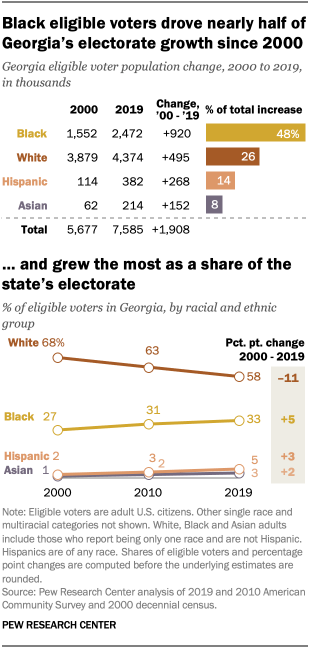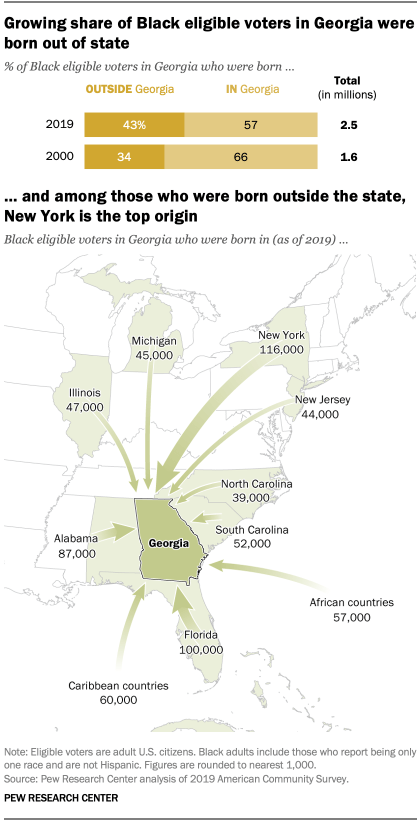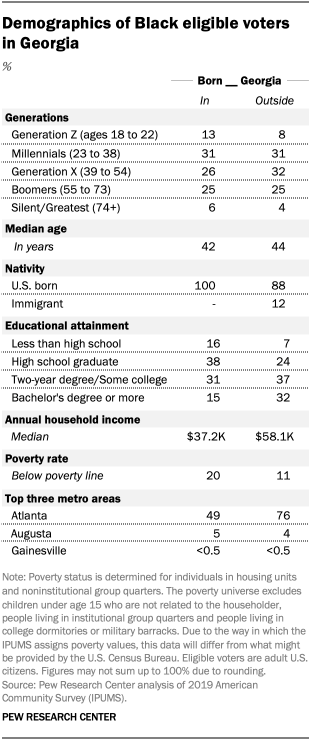It’s Tex-Mex but Superica is fire. Never met anyone who has been and didn’t enjoy it.Thank you. These places look good.
You are using an out of date browser. It may not display this or other websites correctly.
You should upgrade or use an alternative browser.
You should upgrade or use an alternative browser.
"The GOAT Black City" The Official: ATL Discussion Thread
- Thread starter FreshFromATL
- Start date
More options
Who Replied?Steel
Superstar
Buckhead trying to secede from the City of Atlanta. I know a city council rep proposed it and the idea is gaining steam among the residents. 
Would be terrible for the city.

Would be terrible for the city.
MajesticLion
Veteran
Buckhead trying to secede from the City of Atlanta. I know a city council rep proposed it and the idea is gaining steam among the residents.
Would be terrible for the city.
Three days ago. Opinion piece. It's unlikely, and would be an uphill climb to achieve. As mentioned before, they'd sooner rally around the idea of getting rid of KLB...and that may be the end run of this kinda talk anyway. Float the outrageous ideas and let people settle for the "middle of the road" option that they wanted in the first place.
These are not tactically stupid people. They've lost in the nationals and will now switch to their ground game, local/state politics. They are very good at it, they've had enough time to practice.
GDPR Support
The idea is not new by any means. It pops up every few years “like the plague,” says Sam Massell, the former Atlanta mayor and Mr. Buckhead himself. He opposes the idea.
The effort is again with us, this time being carried by a nascent and opaque group called the Buckhead Exploratory Committee. Before, this kind of venture was simply daydreaming. But this time, the potential secessionists have a road map created in 2018 by Republican legislators when they allowed the prosperous side of Stockbridge a chance to de-annex from that city and form its own fiefdom, the city of Eagles Landing.
And even though the legislation was written for those who wanted to create their own city (the Stockbridge residents getting left behind had no vote), voters in the hoped-for Eagles Landing still turned it down.
But the template has been set. The Haves of any city can now envision taking their tax base and leaving behind the Have Nots. It’s kind of like the cityhood movement that has gone on in metro Atlanta is on steroids, becoming a mean-spirited, thumb-in-the-eye municipal cannibalization.
According to Jim Durrett, head of the Buckhead Coalition, Massell’s old org, Buckhead has 21% of the city of Atlanta’s population and contributes 47% of its property tax revenue. In all, 38% of Atlanta’s revenue comes from Buckhead, said Durrett, who opposes the plan.
Such a loss of revenue would be devastating.
“This could decapitate the city,” said Michael Koblentz, chair of the Northwest Community Alliance, which touches Buckhead’s southern boundary.
Toss in the fact that Buckhead is majority white and Atlanta isn’t and this whole episode could get real ugly real fast.
“It would appear that it goes against everything Atlanta stands for — being a modern, diverse, successful and progressive city,“ Koblentz said. “To have a majority white city spin off goes against this. This would set Atlanta back generations.”
AVXL
Laughing at you n*ggaz like “ha ha ha”
Buckhead trying to secede from the City of Atlanta. I know a city council rep proposed it and the idea is gaining steam among the residents.
Would be terrible for the city.
Not going to happen and anything the Mayor and her team can do to eliminate this kind of talk is necessary. Over the last couple of decades we’ve seen more of these areas in the Metro area create their own cities but as the article above me states, the impact of Buckhead leaving would be devastating
They’ve got to get the crime under control. That Chik Fil A the lady through this brick in is a couple of miles from Phipps. No reason that type of BS should be going on there or anywhere else in the city
AVXL
Laughing at you n*ggaz like “ha ha ha”
Y’all favorite challenger to Mayor Bottoms is making it official
Atlanta City Council President Felicia Moore officially announced she is running for mayor, telling supporters Thursday that the city is at a “critical juncture” amid a rise in violent crime.
Moore said in a short video message that she is challenging incumbent Mayor Keisha Lance Bottoms in the Nov. 2 race because “the time has come for me to take the next step.”
dj-method-x
Superstar
Yall follow @atlscoop on the gram? They share almost nothing but vid after vid of people getting their cars broken into. It's a fukking epidemic out here. I've been hit twice. One time at Piedmont park and one time in my apt complex parking deck (I live right next to Sandy Springs city hall, there's cameras and shyt everywhere). Police said it's the wild Wild West out here right now. Be careful.
daemonova
hit it, & I didn't go Erykah Badu crazy, #yallmad
You live over by sandy springs city hall, them street parties they had near the ampitheatre was lit before covidYall follow @atlscoop on the gram? They share almost nothing but vid after vid of people getting their cars broken into. It's a fukking epidemic out here. I've been hit twice. One time at Piedmont park and one time in my apt complex parking deck (I live right next to Sandy Springs city hall, there's cameras and shyt everywhere). Police said it's the wild Wild West out here right now. Be careful.
dj-method-x
Superstar
You live over by sandy springs city hall, them street parties they had near the ampitheatre was lit before covid


ajc.com
Kemp allies start ‘Stop Stacey’ group as possible 2022 rematch looms
Greg Bluestein
5-6 minutes
Georgia Republicans are preparing for a potential rematch between Gov. Brian Kemp and Democrat Stacey Abrams with the launch Monday of a “Stop Stacey” group aimed at thwarting her likely 2022 bid.
The group was formed by allies of Kemp and former U.S. Sen. Kelly Loeffler even before Abrams announced whether she’ll run again, a sign of deep concern among Republicans about the threat she poses to the first-term governor next year.
It aims to build a national fundraising infrastructure, mobilize conservative supporters, air anti-Abrams ads and promote media narratives targeting the Democrat ahead of her expected campaign against Kemp four years after he narrowly won their bitter 2018 race.
“We will do whatever it takes to expose Stacey Abrams’ radical network, highlight her dangerous agenda and ultimately defeat her – and her left-wing candidates – at the ballot box,” said Jeremy Brand, a senior strategist with the group, an independent committee. “There is no time to waste: We must stand up, fight back and stop Stacey.”
Abrams and her fellow Democrats enter this election cycle on an upswing. Georgia voted Democratic for president for the first time since 1992 and Republicans lost both U.S. Senate seats – and control of the chamber – in stunning January runoff defeats to Jon Ossoff and Raphael Warnock.
The Fair Fight voting rights group she created has become a fundraising juggernaut, amassing nearly $100 million in the two years since she lost the gubernatorial vote to cement itself as by far the most dominant Democratic-supporting fundraising group in the state.
And she personally recruited Warnock to challenge and eventually oust Loeffler, a wealthy former financial executive who was hand-picked by Kemp to fill a vacant seat. Should she run, she’ll campaign in tandem with Warnock, who faces a 2022 election for a full six-year term.
Kemp, meanwhile, is in need of reinforcements. Former President Donald Trump pressured Kemp to resign and promised to back a primary challenger after he refused his demands to illegally overturn the election, costing the governor support with fellow Republicans.
Governor Brian Kemp listens to a questions presented by a news reporter during a COVID-19 update press conference at the Georgia State Capitol Building in Atlanta, Thursday, January 21, 2021. (Alyssa Pointer/Atlanta Journal-Constitution via AP)
Credit: Alyssa Pointer
Credit: Alyssa Pointer
An Atlanta Journal-Constitution poll released Saturday underscored Kemp’s challenges. His approval rating stands at just 42% and his disapproval is at 51%. More than one-third of Republicans — 36% — disapprove of his performance. That’s more than quadrupled from the 8% of Republicans who held a dim view of Kemp in the AJC’s January 2020 poll.
“I plan on running in 2022. I’m not worried about any kind of primary fight. We’ll be victorious. I personally think it’s unnecessary,” Kemp told the AJC in a recent interview. “I hope at the end of the day people come our way, but if they don’t, we’ll get them back after a potential primary.”
Abrams, by contrast, is on more solid footing. According to the poll, about 51% of Georgians see the Democrat in a favorable light, including 10% of Republicans, while 41% view her unfavorably.
The Stop Stacey group will launch with seed funding of at six-figures from Kemp allies and will seek more financing from state and national Republicans hoping in hopes that rallying against Abrams can unite the fractured GOP.
It’s led by some of the same operatives who helped orchestrate Kemp’s 2018 victory but are no longer running his political strategy. Kemp recently hired a new team of consultants to shape his campaign, while his former network is behind the Stop Stacey group and others from outside.
The group’s website, StopStacey.org, echoes the messages that dominated Kemp’s 2018 bid, calling her a “radical leftist” and tying her to Hollywood elite and billionaire George Soros.
“She ‘flipped’ Georgia for Joe Biden and Kamala Harris. She delivered two Senate seats for Chuck Schumer. Now, she’s aiming for total control,” it reads. “We have to Stop Stacey and Save America before it’s too late!”
10/23/2018 -- Atlanta, Georgia -- Georgia Gubernatorial Democratic candidate Stacey Abrams and Republican candidate Brian Kemp greet each other before a live taping of the 2018 Gubernatorial debate for the Atlanta Press Club at the Georgia Public Broadcasting studio in Atlanta, Tuesday, October 23, 2018. (ALYSSA POINTER/ALYSSA.POINTER@AJC.COM)
Last edited:
End up going to Ikea on Saturday Morning then I hit up Maple Biscuits Company because we needed reservations for West Egg Cafe. I'd recommend it if you're looking for a nice quick breakfast.A couple more restaurants for y’all to try out, both in West Midtown
Miller Union: Arguably the new GOAT in the city. Upscale take on traditional southern food. Literally across the street from Compound
Bocado: Similar swag to Miller Union, on Marietta St near Brady Ave.
Both are super dope, date night spots. Valentines Day is less than a month away breaths start securing your reservations now

Black eligible voters make up 48% of growth in Georgia electorate since 2000
NEWS IN THE NUMBERS
December 15, 2020
Black eligible voters have accounted for nearly half of Georgia electorate’s growth since 2000
By Abby Budiman and Luis Noe-Bustamante
Black eligible voters in Georgia have played a significant role in driving the growth of the state’s electorate over the past two decades. Between 2000 and 2019, Georgia’s eligible voter population grew by 1.9 million, with nearly half of this increase attributed to growth in the state’s Black voting population, according to a Pew Research Center analysis of new census data.
How we did this

As an emerging battleground state in national elections, Georgia’s changing electoral makeup has been the focus of renewed attention in the 2020 election cycle. This is particularly true now given that the Jan. 5 runoff election for the state’s two U.S. Senate seats could determine which party controls that chamber.
Prominent public figures such as Democrat Stacey Abrams, a former lawmaker who lost a close race for governor in 2018, have highlighted Georgia’s racial and ethnic diversification as a major driver behind Joe Biden’s victory.
Biden won the state by a very narrow margin of just 0.2%, with about 12,000 votes more than Donald Trump. But it was the first time a Democratic presidential candidate had won the state in nearly three decades.
In 2019, the Black voting population in Georgia reached a record high of 2.5 million eligible voters, making up a third of the state’s total electorate. As a share of eligible voters in the state overall, Black voters saw a 5 percentage point increase between 2000 and 2019. This was the highest growth rate of any racial or ethnic group in Georgia – and also the largest percentage point increase among Black voters in any state in the country.
Related: Black, Latino and Asian Americans have been key to Georgia’s registered voter growth since 2016
The Hispanic and Asian American voting populations in Georgia have also grown significantly, more than tripling in size between 2000 and 2019. However, these groups accounted for much smaller shares of the state’s electorate, 5% and 3%, respectively. The number of White voters in the state also grew during this time, but at a lower rate than other major racial and ethnic groups. As a result, the White share of Georgia’s eligible voters declined by 11 points, though the group still accounted for the majority (58%) of Georgia’s electorate in 2019.
Demographics of Georgia eligible voters by race and ethnicity
Migration from outside Georgia a major source of growth for state’s Black electorate

The growth of Black eligible voters in Georgia has been largely driven by migration into the state from other parts of the country, as well as from outside the United States. Between 2000 and 2019, Black eligible voters who were born outside of Georgia accounted for a majority (58%) of the increase in the state’s Black voting population. (It is not possible to know from American Community Survey data when these individuals relocated to the state of Georgia. Eligible voters include both U.S.-born individuals and naturalized immigrants.)
In 2019, 43% of Black eligible voters in Georgia were born outside of the state (1.1 million out of 2.5 million), up from 34% in 2000 (532,000 out of 1.6 million). Over the same period, the number of Black voters who were born outside of Georgia doubled, while the number of Black voters born in the state increased by just 38%.
Georgia’s Black eligible voters born outside of the state have diverse origins. In 2019, among those born in the U.S., about 116,000 are from New York, more than double their number since 2000. They are followed by those born in Florida (100,000), Alabama (87,000), South Carolina (52,000) and Illinois (47,000).
These numbers have shifted in the past two decades. In 2000, those born in Alabama (66,000) and Florida (52,000) were the largest groups among Georgia’s Black eligible voters born outside of the state. New York (50,000), South Carolina (40,000) and North Carolina (24,000) rounded out the top five. Black eligible voters who were born outside the U.S. have also played a significant role in the growth of Georgia’s Black electorate. In 2019, about 123,000 Black eligible voters in the state were born outside of the country, with most tracing their origins to nations in the Caribbean (60,000) and Africa (57,000). Among those born in the Caribbean, the top countries of origin were Jamaica, Haiti, and Trinidad and Tobago, while Nigeria, Ghana and Ethiopia top the list among those who were born in Africa.

Meanwhile, naturalized citizens only make up 5% of Georgia’s overall Black electorate, but their numbers have grown more than fourfold over the past two decades, from 26,000 in 2000 to 123,000 in 2019. During this time, the country overall has also seen a substantial increase in its immigrant electorate.
Immigrant eligible voters in Georgia make up even larger shares of the Asian and Latino electorates than among the Black electorate. About three-in-four (74%) Asian eligible voters and one-in-four (26%) Latino eligible voters are naturalized citizens in the state.
Black eligible voters who were born outside Georgia have demographic characteristics that differ from those who were born in the state.
Those born outside the state had higher levels of education overall. In 2019, they were over twice as likely to have at least a bachelor’s degree or more education. Additionally, their median household income was 56% higher than that of the Georgia born ($58,100 vs. $38,200).
Poverty rates also differ between the groups. One-fifth of Black eligible voters (20%) who were born in the state of Georgia lived in poverty, a higher share than among those born outside the state (11%). In addition, Black eligible voters who were born outside the state were more likely to reside in the state’s largest urban areas. The Atlanta metro area is home to 76% of Black eligible voters who were born outside of the state, while just 49% of Georgia’s Black eligible voters born in the state resided in the metro.
My Favorite Hue, is Stacey Blue



